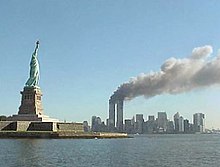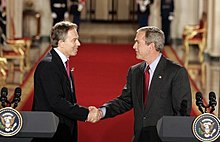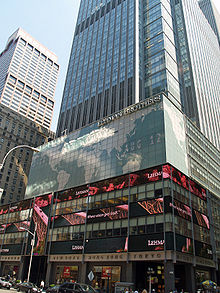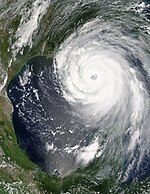2000s
This article has multiple issues. Please help improve it or discuss these issues on the talk page. (Learn how and when to remove these template messages)
No issues specified. Please specify issues, or remove this template. |
Error: Image is invalid or non-existent. From left, clockwise: September 11 attacks in 2001; Boxing Day tsunami in 2004; Resulting damage to the city of New Orleans after Hurricane Katrina in 2005; Israeli bombardment of Tyre during the Israel-Lebanon War in 2006; US President George W. Bush and Vice President Dick Cheney; toppling of the statue of Saddam Hussein shortly after the Invasion of Iraq in 2003; and in the center, the Beijing Olympics opens in 2008. |
| Millennium |
|---|
| 3rd millennium |
| Centuries |
| Decades |
| Years |
| Categories |
The 2000s was the decade that started on January 1, 2000 and ended on December 31, 2009. It was the decade in which the 21st century and 3rd millennium began.
Globalization, which had intensified in the post-Cold War 1990s, continued to influence the world in the 2000s.[1][2][3][4][5] The institutions, linkages and technologies that emerged or were redefined earlier would subsequently in this decade benefit many countries, in particular China and India. However in other parts of the world such progress failed to address ongoing struggles with modernity, most notably characterized by the rise of al-Qaeda and other Islamist groups.[6] The September 11 attacks in 2001 ultimately led the United States, United Kingdom and other nations controversially[7] to invade and occupy Afghanistan and Iraq, and to implement various anti-terrorist measures at home and abroad in what was known as the War on Terror. The European Union saw further integration and expansion throughout much of Europe. The economic growth of the 2000s, while responsible for lifting millions out of poverty, also had environmental consequences, raised demand for diminishing energy resources, and was still shown to be vulnerable as demonstrated during the Global Financial Crisis of the late 2000s.[8]
Names of the Decade
Unlike previous decades, the 2000s have not yet attained a universally accepted name in the English-speaking world..[9][10][11]
Orthographically, the decade can be written as "2000s" or "'00s". Some people read "2000s" as "two-thousands" and thus simply refer to the decade as "the two-thousands". Some read it as the "00s" (pronounced "Ohs"), as the single years within the decade are usually referred to as starting with an "Oh", such as "Oh-Eight". On January 1, 2000, the BBC listed "The Noughties" (derived from "nought" [12] a word used for zero in many English-speaking countries), as a potential moniker for the new decade[13]. Others advocate the term "The Aughts", which was widely used at the beginning of the previous century, sometimes even combining it with "Naught" to put a linguistic twist on the time period, such as "The Naught Aughts", or even "The Naughty Aughties"[14][15].Slate Magazine puts another humorous twist on the "00s" as the "Uh-Ohs"[16] in reference to society's inability to come up with a name.
Politics and wars

The "War on Terrorism" and War in Afghanistan began after the September 11 attacks in 2001.[17][18] The International Criminal Court was formed a year later. A United States-led coalition invaded Iraq, and the Iraq war led to the end of Saddam Hussein's rule as Iraqi President and the Ba'ath Party regime in Iraq. Al-Qaeda and affiliated Islamist militant groups performed terrorist acts throughout the decade. These acts included the Madrid Train Bombings in 2004, 7/7 London Bombings in 2005, and the Mumbai attacks related to al-Qaeda in 2008. The EU expanded, incorporating some former communist nations. North Korea and Iran were seen as strong nuclear threats, following two North Korea nuclear tests, as well as some Iranian threats.
The War on Terrorism generated extreme controversy around the world, with questions regarding the justification for U.S. actions leading to a loss of support for the American government, both in and outside the United States. Additional armed conflict occurred in the Middle East, including between Israel and Hezbollah, then with Israel and the Hamas. The greatest loss of life due to natural disaster came from the 2004 tsunami killing around a quarter-million people and displacing well over a million others. Cooperative international rescue missions by many countries from around the world including the United States helped in efforts by the most affected nations to rebuild and recover from the devastation. An enormous loss of life and property value came in 2005, when Hurricane Katrina flooded nearly the entire city of New Orleans. The resulting political fallout was severely damaging to the Bush administration because of its perceived failure to act promptly and effectively. A key political event occurred in 2008 with the election of Barack Obama as President of the United States, as he would become the first African-American U.S. President.[19]
Major political changes


- George W. Bush was sworn in as the 43rd President of the United States on January 20, 2001 following a sharply contested election.
- Gordon Brown succeeds Tony Blair as Prime Minister of the United Kingdom in 2007.
- José Luis Rodríguez Zapatero replaced José María Aznar as President of the Government of Spain in 2003.
- Dmitry Medvedev succeeded Vladmir Putin as the President of Russia in 2008.
- Premier Wen Jiabao and President Hu Jintao, replaced former People's Republic of China Premier Zhu Rongji and former People's Republic of China President Jiang Zemin.
- Angela Merkel becomes the first female Chancellor of Germany in 2005.
- Paul Martin replaces Jean Chretien as Prime Minister of Canada in 2003 by becoming the new leader of the Liberal Party. Stephen Harper was elected Prime Minister in 2006 following the defeat of Paul Martin's government in a motion of no confidence.
- Nicolas Sarkozy is elected President of the French Republic in 2007 succeeding Jacques Chirac, who had held the position for 12 years.
- Kevin Rudd replaces John Howard in 2007 as Prime Minister of Australia.
- Barack Obama is sworn in as the 44th President of the United States in 2009, becoming the nation's first African American president.
- Manmohan Singh was elected and reelected Prime Minister in India.
- Fidel Castro resigns in 2008 on health reasons, having ruled Cuba for almost 50 years.
- Nancy Pelosi is designated Speaker of the United States House of Representatives in 2007, following the Democratic Party's gains in the 2006 Midterm Elections. Pelosi became the first woman to hold the title.
- Luiz Inácio Lula da Silva was elected and reelected President of Brazil.
- Recep Tayyip Erdogan was elected as Prime Minister of Turkey in 2002. Abdullah Gul was elected as President of Turkey. The two leaders can be named as the first "Islamists" leaders of Turkey.
Political evolutions
- Left-wing governments emerge in South American countries. These governments include those of Hugo Chavez in Venezuela since 1999, Fernando Lugo in Paraguay, Rafael Correa in Ecuador, and Evo Morales in Bolivia. With the creation of the ALBA, Fidel Castro and Hugo Chavez wanted to oppose the allegedly imperialist policy of the United States. Fidel Castro, leader of Cuba since 1959, transferred his duties to his brother Raúl in 2006.
- European integration makes progress with the definitive circulation of the euro in fifteen countries in 2002 and the widening of European Union to 27 countries in 2007. A European Constitution bill is rejected by French and Dutch voters in 2005, but a similar text, the Treaty of Lisbon, is drafted in 2007 and finally adopted by the 27 members countries.
Internal conflicts
- The Somali Civil War, which began in 1991, went through the 2000s without a result.
- 2002 Venezuelan coup d'état attempt.
- The War in Darfur lasted from 2003 to 2009.
- 2006 Thai coup d'état.
- 2007 Zimbabwean political crisis.
- 2007 political crisis in Pakistan, Pervez Musharraf retired after the assassination of Benazir Bhutto
- The 2009 Iranian presidential election sparked massive protest demonstrations in Iran and around the world. Several demonstrators in Iran were killed or imprisoned.
- The Sri Lankan Civil War (1983-2009) came to an end after the government defeated the Liberation Tigers of Tamil Eelam.
- The 2009 Honduran coup d'état was the first successful coup attempt in Latin America since the 1980s. Overthrown president Manuel Zelaya is currently being hosted by the Brazilian Embassy.
- Ergenekon trials in Turkey.
Wars

- The September 11 attacks led to the War in Afghanistan, and War in Iraq under the larger heading The War on Terrorism.
- War in Iraq (2003-present), led to the fall of Saddam Hussein. This war was originally presented as part of the War on Terror, which proved to be based on a false claim that Iraq had weapons of mass destruction at its disposal.[20]
- Israel waged a war against Hezbollah in south Lebanon in 2006.
- 2008 South Ossetia War between Russia and Georgia.
- Increased tension between Israel and Palestine led to the 2008-2009 Gaza Conflict.
- The War in Somalia spawned pirates who invade ships off the coast of Somalia.
Terrorist attacks
- September 11 attacks in Washington, D.C., New York City and Shanksville, Pennsylvania (nearly 3,000 killed)
- 2002 Bali Bombings in Bali, Indonesia (202 killed)
- 2003 Istanbul bombings in Istanbul, Turkey (57 killed)
- 2004 Madrid train bombings (nearly 200 killed)
- 7 July 2005 London bombings (56 killed)
- November 9 2005 Amman bombings (59 killed)
- 2008 Mumbai attacks (nearly 300 killed)
Nuclear threats
- In 2003 the United States invaded Iraq, over concerns leader Saddam Hussein had weapons of mass destruction including chemical and biological weapons. The Iraq Inquiry (still ongoing) may explain more on this situation, but in the meantime, the U.S. ended the regime of Saddam Hussein and did not find any nuclear bombs in Iraq.
- North Korea successfully performed two nuclear tests in 2006 and 2009.
- On November 30, 2009, the Iranian Government announced plans to build 10 more uranium nuclear plants.
- The Doomsday Clock, the symbolic representation of the threat of nuclear annihilation, moved four minutes closer to midnight: Two minutes in 2002 and two minutes in 2007 to 5 minutes to midnight.
Economics
The most significant evolution of the early 2000s in the economic landscape was the long-time predicted breakthrough of economic giants China and India, that had a double-digit growth during nearly the whole decade. The rapid catching-up of emerging economies with developed countries sparked some protectionist tensions during the period and was partly responsible for an increase in energy and food prices at the end of the decade. The economic developments in the latter third of the decade were dominated by a worldwide economic downturn, which started with the crisis in housing and credit in the United States in late 2007, and led to the bankruptcy of major banks and other financial institutions[21]. The outbreak of this global financial crisis sparked a global recession, beginning in the United States and affecting most of the industrialized world.
Economic growth in the world
Between 1999 to 2008, according to the World Bank statistics for GDP [22][23],
- The world's economy doubled in size from U.S. $30.21 to U.S. $60.59 trillion.
- The United States (U.S. $14.2 trillion) retained its position of possessing the world's largest economy. However, the size of its contribution to the total global economy dropped from 28.8% to 23.4%.
- Japan (U.S. $4.9 trillion) retained its position of possessing the second largest economy in the world, but its contribution to the world economy also shrank significantly from 14.5% to 8.1%.
- China (U.S. $4.33 trillion) went from being the seventh largest to the third largest economy, and in 2008 contributed to 7.1% of the world's economy, up from 3.3% in 1999.
- Germany (U.S. $3.65 trillion), France (U.S. $2.85 trillion), United Kingdom (U.S. $2.65 trillion) and Italy (U.S. $2.29 trillion) followed as the 4th, 5th, 6th and 7th largest economies, respectively.
- Brazil (U.S. $1.61 trillion) retained its position as the 8th largest economy, followed closely by Russia (U.S. $1.607 trillion) and Spain (U.S. $1.604 trillion). Russia had moved from the 16th to 9th position, while Spain remained at 10th.
- Other major economies included Canada (U.S. $1.4 trillion; 11th, down from 9th), India (U.S. $1.22 trillion; remaining at 12th), Mexico (U.S. $1.09 trillion; 13th, down from 11th), Australia (U.S. $1.02 trillion; remaining at 14th) and South Korea (U.S. $929 billion; 15th, down from 13th).
- In terms of purchasing power parity in 2008, the six largest economies were the United States (U.S. $14.2 trillion), China (U.S. $7.9 trillion), Japan (U.S. $4.35 trillion), India (U.S. $3.39 trillion), Germany (U.S. $2.93 trillion) and Russia (U.S. $2.29 trillion). These countries maintained the rankings they had in 1999 except Russia, which had climbed from 10th to 6th place, surpassing the United Kingdom, France, Brazil and Italy.[24][25]
Globalization and its discontents

The removal of trade and investment barriers, the growth of domestic markets, artificially low currencies and the proliferation of education assisted China, India and other developing countries to enjoy economic growth through the decade, as manufacturing (and increasingly, services) industries were relocated from high to low wage countries. In turn many of these countries accumulated capital, and invested abroad. Other countries, including the United Arab Emirates, Australia, Brazil and Russia, benefited from increased demand for their mineral and energy resources that global growth generated. The hollowing out of manufacturing was felt in Japan and parts of the United States and Europe which had not been able to develop successful innovative industries.
While global trade rose in the decade (partially driven by China's entry into the WTO in 2001), there was little progress in the multilateral trading system. International trade continued to expand during the decade as emerging economies and developing countries, in particular China and South-Asian countries, benefited low wages costs and most often undervalued currencies. However, global negotiations to reduce tariffs did not make any progress, as member countries of the World Trade Organization did not succeed in finding agreements to stretch the extent of free trade.[28] The Doha Round of negotiations, launched in 2001 by the WTO to promote development, failed to be completed because of growing tensions between regional areas. Nor did the Cancun Conference in 2003 find a consensus on services trade[29] and agricultural subsidies[30].
The comparative rise of China and other developing countries also contributed to their growing clout in international fora. In 2009 it was determined that the G20, originally a forum of finance ministers and central bank governors, would replace the G8 as the main economic council of wealthy nations.
The age of turbulence
The decade was marked by two financial and economic crises. In 2000, the Dot-com bubble burst, causing turmoil in financial markets and a decline in economic activity in the developed economies, in particular in the United States.[31] However, the impact of the crisis on the activity was limited thanks to the intervention of the central banks, notably the U.S. Federal Reserve System. Indeed, Alan Greenspan, leader of the Federal Reserve until 2006, cut the interest rates several times to avoid a severe recession,[32] allowing an economic revival in the U.S.[33]

As the Federal Reserve maintained low interest rates to favor economic growth, a housing bubble began to appear in the United States. In 2007, the rise in interest rates and the collapse of the housing market caused a wave of loan payment failures in the U.S. The subsequent mortgage crisis caused a global financial crisis, because the subprime mortgages had been securitized and sold to international banks and investment funds.[34] Despite the intervention of central banks successfully to avoid a complete collapse of the banking sector and to relieve the financial markets, the economic activity was severely affected around the world in 2008 and 2009,[35] with disastrous consequences for carmakers.[36]
Reactions of governments in all developed and developing countries against the economic slowdown were largely inspired by keynesian economics. The end of the decade was characterized by a Keynesian resurgence,[37] while the influence and media popularity of left-wing economists[38] Joseph Stiglitz and Paul Krugman (Nobel Prize recipients in 2001 and 2008, respectively) did not stop growing during the decade.[39] Several international summits were organized to find solutions against the economic crisis and to impose greater control on the financial markets. The G-20 became in 2008 and 2009 a major organization, as leaders of the member countries held two major summits in Washington in November 2008 and in London in April 2009 to regulate the banking and financial sectors,[40] and also succeeding in coordinating their economic action and in avoiding protectionist reactions.
Energy crisis
From the mid-1980s to September 2003, the inflation-adjusted price of a barrel of crude oil on NYMEX was generally under $25/barrel. During 2003, the price rose above $30, reached $60 by August 11, 2005, and peaked at $147.30 in July 2008.[41] Commentators attributed these price increases to many factors, including reports from the United States Department of Energy and others showing a decline in petroleum reserves, worries over peak oil, Middle East tension, and oil price speculation.[42]

For a time, geopolitical events and natural disasters indirectly related to the global oil market had strong short-term effects on oil prices. These events and disasters included North Korean missile tests, the 2006 conflict between Israel and Lebanon, worries over Iranian nuclear plants in 2006 and Hurricane Katrina. By 2008, such pressures appeared to have an insignificant impact on oil prices given the onset of the global recession. The recession caused demand for energy to shrink in late 2008 and early 2009 and the price plunged as well. However, it surged back in May 2009, bringing it back to November 2008 levels.[43]
Many fast-growing economies throughout the world, especially in Asia, also were a major factor in the rapidly increasing demand for fossil fuels, which—along with fewer new petroleum finds, greater extraction costs, and political turmoil—forced two other trends: a soar in the price of petroleum products and a push by governments and businesses to promote the development of environmentally friendly technology (known informally as "green" technology). However, a side-effect of the push by some industrial nations to "go green" and utilize biofuels was a decrease in the supply of food and a subsequent increase in the price of the same. It partially caused the 2007 food price crisis, which seriously affected the world's poorer nations with an even more severe shortage of food.[44]
Science and technology
Science
This template is a customized wrapper for {{[[Template:{{{1}}}|{{{1}}}]]}}. Any field from {{[[Template:{{{1}}}|{{{1}}}]]}} can work so long as it is added to this template first. Questions? Just ask here or over at [[Template talk:{{{1}}}]]. |
|

|-
|

|}
- The Mars Exploration Rover mission successfully reached the surface of Mars in 2004, and sent detailed data and images of the landscape back to Earth.
- The Human Genome Project was completed in 2000.
- On July 29, 2005 the discovery of Eris, a Kuiper Belt object larger than Pluto, is announced. In August 2006 Pluto is demoted to a "dwarf planet" after being considered a planet for 76 years. Other "dwarf planets" in our solar system now include Ceres and Eris.
- The National Geographic Society and IBM established the Genographic Project, which aimed to trace the ancestry of every living human down to a single male ancestor.
- Astrophysicists studying the universe confirmed its age at 13.7 billion years. Astronomers also identified the average colour of the universe as a pale beige, which they termed "cosmic latte".
- On February 1, 2003, during an attempted reentry into the Earth's atmosphere, Space Shuttle Columbia disintegrated over Texas, killing all seven STS-107 crew members.
- On June 21, 2004, Scaled Composites SpaceShipOne completed the first privately funded human spaceflight in history, later in the year winning the US$10 million Ansari X Prize. Later, British billionaire entrepreneur Richard Branson introduced Virgin Galactic, a space tourism company aiming to launch private tourists on sub-orbital spaceflights within a few years.
- CERN's Large Hadron Collider, the largest particle accelerator ever made, was completed.[45]
- First imagery of an erupting submarine volcano—West Mata—was released.[46]
- The International Space Station became the largest space station and the longest continuously crewed, beginning on November 2, 2000, with the docking of the Expedition 1 crew.
Physics
- Astrophysicists studying the universe confirm its age at 13.7 billion years, discover that it will most likely expand forever without limit, and conclude that only 4% of the universe's contents are ordinary matter (the other 96% being still-mysterious dark matter, dark energy, and dark flow).
- Scientists discovered that computers could crash in 2037, 2038, 2070 & 10,000 A.D. according to research into computer software.
Technology

This template is a customized wrapper for {{[[Template:{{{1}}}|{{{1}}}]]}}. Any field from {{[[Template:{{{1}}}|{{{1}}}]]}} can work so long as it is added to this template first. Questions? Just ask here or over at [[Template talk:{{{1}}}]]. |
|

|-
|

|-
|
|} Technological advancements were as revolutionary and diversified as in previous decades. In the field of digital electronics, advancements were considerable. Mobile phones, digital cameras, and digital audio players[47] became household items over the course of a few years. Email and broadband Internet connections became nearly ubiquitous in the industrialized world. The entertainment industry struggled to find digital delivery systems for music, movies, and other media that reduce piracy and preserve profit. The long-awaited Y2K Problem did not majorly occur; small bugs and glitches occurred in software, but did not wreak much havoc. Internet commerce became standard for reservations; stock trading; promotion of music, arts, literature, and film; shopping; and other activities. During this decade certain websites and search engines became prominent worldwide as transmitters of goods, services and information. Some of the most popular and successful online sites or search engines of the 00s included: Wikipedia, Google, Yahoo, Amazon, eBay, MySpace, Facebook, Twitter, and YouTube. Email became a standard form of interpersonal written communication, with popular addresses available to the public on Hotmail, Gmail and Yahoo! Mail.
Electronics and communications
- The digital audio player began a steady climb in popularity, due in most part to the iPod, which cemented itself as a cultural and technological icon of the 2000s.
- Touchscreen and flip-phone mobile telephones became popular, and mobile phone usage as a whole neared 100% of the population in Europe and America.[citation needed] In Australia the amount of mobile phones actually exceeded their population.[48]
- High Definition TV became popular in the Western world.
- Digital cameras became frequently used in the developed world.
- Digital video recorders replaced VCRs as the preferred instrument for TV recording.
Robotics
- The U.S. Army used increasingly effective unmanned aerial vehicles in war zones, such as Afghanistan.
Software
- Microsoft Windows Me, XP, Vista and 7 were released.
- Mac OS X was released.
- Computer-generated Imagery software is widely used to create films, such as Transformers and Avatar.
- Open Source software such as the Linux operating system and the Mozilla Firefox web browser began to gain ground.
Population and social issues
AIDS continued to expand during the decade. New diseases of animal origin appeared for a short time, the mad cow disease in 2003 and the bird flu in 2007, but they appeared not to be dangerous for man. On the contrary, the swine flu was declared a pandemic by the World Health Organization in 2009.
Population continued to grow in most countries, in particular in developing countries, though overall the rate slowed. According to United Nations estimates, world population reached six billion in late 1999[49], while it was nearly 6.8 billion in late 2009.[50] The United States population outpaced 300 millions inhabitants in 2007. Most developed countries imposed greater control over immigration flows, notably the United States and European Union members.
Some of the social issues of worldwide concern during the 2000s were gender equality and human rights. In the United States, health care, civil liberties, and abortion were also prominent issues.
Environment
The decade witnessed an increase in the number of natural disasters and visible signs of global warming. Climate change became a growing preoccupation for populations and considered as a global issue by governments, and environmental governance made significant progress.
Climate change
Climate change and global warming became household words in the 2000s. Predictions tools made significant progress during the decade, independent organisms such as the IPCC gained influence, and studies such as the Stern report almost established a consensus in public opinion. The necessity to fight against climate change also began to attain unanimous recognition, in spite of political and economic challenges.
The global temperature kept growing during the decade. On December 8, 2009, the Associated Press reported that the World Meteorological Organization had predicted that the 00s would be the warmest decade since records began in 1850,[51] with four of the five warmest years since 1850 having occurred in the 00s. Some of the data used in the prediction was released by the Met Office, the United Kingdom's national weather service, and involved temperature recordings from over 1,500 stations worldwide, which the Press Association described as "the latest efforts to debunk claims by sceptics that global warming data was manipulated by scientists".[52]

Major natural disasters became more frequent and helped change public opinion. One of the deadliest heat waves in human history happened during the 00s, mostly in Europe, e.g. the 2003 European heat wave killing 37,451 people over the summer months.[53] In February 2009, a series of highly destructive bushfires started in Victoria, Australia, lasting into the next month. While the fires are believed to have been caused by arson, they were widely reported as having been fueled by an excessive heatwave that was due in part to climate change.
International actions
Climate change became a major issue for governments, populations and scientists. Debates on global warming and its causes made significant progress, as climate change denials were refuted by most scientific studies. Decisive reports such as the Stern Review and the 2007 IPCC Report almost established a Climate change consensus. NGOs' actions and the commitment of political personalities (such as former U.S. Vice President Al Gore) also urged to international reactions against climate change. Documentary films An Inconvenient Truth and Home may have had a decisive impact.
Under the auspices of The UN Convention on Climate Change the Kyoto Protocol (aimed at combating global warming) entered into force on 16 February 2005. As of November 2009, 187 states have signed and ratified the protocol.[54] In addition The UN Convention on Climate Change helped coordinate the efforts of the international community to fight potentially disastrous effects of human activity on the planet and launched negotiations to set an ambitious program of carbon emission reduction that began in 2007 with the Bali Road Map. However, the representatives of the 192 member countries gathered in December 2009 for the Copenhagen Conference failed to reach a binding agreement to reduce carbon emissions because of divisions between regional areas.
However, as environmental technologies were to make up a potential market, some countries made huge investments in renewable energies, energy conservation and sustainable transport. Many governments launched national plans to promote sustainable energy. Notably, the European Union members launched a European package on climate in 2007 to reduce further their carbon emission and improve their energy-efficiency, and in 2009 the United States democrat administration set up the Green New Deal, an ambitious plan to create millions of jobs in sectors related to greenery.
Natural disasters

The 2000s have seen some of the worst and most destructive natural disasters in history. 2003 produced one of the worst heatwaves in recorded human history, as Europe was hit by a 40 degrees celsius heatwave killing thousands. The 2004 Indian Ocean Earthquake which caused a massive tsunami, was the most destructive tsunami, and the second most destructive earthquake and fifth most destructive natural disaster of all time. Several other earthquakes were hugely destructive including the 2005 Kashmir earthquake, the 2008 Sichuan earthquake, and the 2003 Bam earthquake.
Several typhoons and hurricanes resulted in extreme destruction in this decade, with Hurricane Katrina nearly destroying New Orleans, followed by Hurricane Rita, which wreaked destruction along the U.S. Gulf Coast. In 2008 the massive Hurricane Ike became the third most destructive hurricane to ever make landfall in the United States. The 2009 H1N1 (swine flu) flu pandemic is also considered a natural disaster, and is the worst epidemic/pandemic of the decade with nearly 12,000 deaths so far.
Cyclone Nargis was a strong tropical cyclone that caused the worst natural disaster in the recorded history of Myanmar.[55] The cyclone made landfall in the country on May 2, 2008, causing catastrophic destruction and at least 146,000 fatalities, leaving thousands more people still missing.[56]
Popular culture
The 2000s was a decade where celebrity, fame and notoriety were accorded a big public focus, and were given excessive media attention and importance. Many people felt entitled to their 15 minutes of fame, and the rise of Reality TV helped many people to become public figures for just being personalities rather than actually doing anything noteworthy.
Film

- Oscar winners: Gladiator (2000), A Beautiful Mind (2001), Chicago (2002), The Lord of the Rings: The Return of the King (2003), Million Dollar Baby (2004), Crash (2005), The Departed (2006), No Country for Old Men (2007), Slumdog Millionaire (2008)
- Some of Hollywood's most notable blockbuster films of the 2000s include: The Lord of the Rings film trilogy, Pirates of the Caribbean-film series, Batman Begins and The Dark Knight, Harry Potter-film series, Shrek-film series, Spider-Man-film series, Ice Age-film series, Finding Nemo, Star Wars Prequel trilogy, Transformers-film series, Indiana Jones and the Kingdom of the Crystal Skull, The Da Vinci Code, The Chronicles of Narnia-film series, The Matrix Reloaded and Matrix Revolutions, 2012, Up, The Twilight Saga: New Moon, Kung Fu Panda, The Incredibles, Cars, Hancock, Ratatouille and The Passion of the Christ.
- Usage of computer-generated imagery became more widespread in films during the 2000s.
- Documentary and mockumentary films, such as March of the Penguins and Super Size Me, were popular in the 2000s.
- Online films become popular.
- More movies started using three dimensional projection such as Avatar.
Music

Trends
- According to some, including The Guardian, music styles during the 2000s changed very little from how they were at the end of the 1990s.[57]
Best Sellers
- The best-selling artists of the decade were the rapper Eminem and the rock band the Beatles.[58][59] Billboard magazine named Eminem and Beyoncé as the artists with the best performance on the Billboard charts.[60][61]
- The best-selling album of the decade was the The Beatles' compilation album "1" [59][62]
Death of Michael Jackson
Pop legend Michael Jackson died in June 2009, creating the largest public mourning since the death of Diana, Princess of Wales 12 years earlier in 1997.[63][64][65]
Television
- Flat-screen TVs become popular [citation needed]
- TV becomes available on the net of some mobile phones. [citation needed]
- HD TV becomes very popular towards the last quarter of the decade. [citation needed]
- Reality TV, talent shows and cooking programs grow in popularity.[citation needed]
- Telenovelas (Latin American soap operas), grow in popularity in the United States and worldwide. Some all-time novela successes of the 2000s decade include Televisa's Amor Real (2003), Rede Globo's El Clon (2001), RCTV's Mi Prima Ciela (2007), RCN's Pura Sangre (2007), among others. [citation needed]
Sports

The Sydney Games, held in 2000, followed the hundredth anniversary of the Olympic Games in Atlanta in 1996. The Athens Games, in 2004, were also a strong symbol, for modern Olympic Games were inspired by the competitions organized in Ancient Greece. Finally, the Beijing Games saw the emergence of China as a major sports power, with the highest number of titles for the first time. The 2002 Salt Lake City and the 2006 Turin Winter Olympic Games were also major events, though less popular.
Football (soccer) gained popularity in the world, as the two World Cups organized in South Korea, Japan, and Germany were major worldwide events, while regional events Copa América and Euro Cup were also popular. Rugby increased in size and audience, as the Rugby World Cup became the third most watched sporting event in the world with the 2007 Rugby World Cup organized in France.
Most popular individual sports were dominated by champions. Michael Schumacher, the most titled F1 driver, won five F1 World Championships during the decade and finally retired in 2006, yet eventually confirming his come-back to F1 for 2010. Lance Armstrong won all the Tour de France between 1999 and 2005, also an all-time record. Swiss tennis player Roger Federer won 15 Grand Slam titles to become the most titled player. Tiger Woods made significant achievements in golf tournaments.
Computer and video games
- The number-one-selling game console as of 2009, the PlayStation 2, was released in 2000 and remained popular up to the end of the decade, even after PlayStation 3 was released.
- Popular video games include Gran Turismo, FIFA, the Pokemon series, Madden NFL, The Sims and its sequels, the Halo series, Wii Sports, Nintendogs, Grand Theft Auto, the Call of Duty series and World of Warcraft.
- Online gaming became very popular, especially seen in games such as World of Warcraft, released in 2004 and with many expansion packs in the years following.
- Motion controlled video games grew in popularity, from the PlayStation 2s EyeToy to Nintendo's successful Wii console.
Fashion

Significant fashion trends of the 2000s include:
- Crocs
- Ugg boots
- Skinny Jeans
- The Wings hairstyle became highly popular for teenage & pre-teen boys for most of the decade, & continiung into the 2010s, this was also highly seen in pop culture in many films & young celebrities of the time. Soccer player David Beckham helped to popularize the fauxhawk.
- Meanwhile for girls simple semi-long and straight hair is the most dominant style, but many other hairstyles were popular, including a revival of the beehive in the late 2000s.[citation needed]
Print media
- The decade saw the steady decline of books, magazines and newspapers as the main conveyors of information and advertisements.[66][67][68]
- News blogs grew in readership and popularity; cable news and other online media outlets became competitive in attracting advertising revenues and capable journalists and writers are joining online organizations. Books became available online, and electronic devices such as Amazon Kindle threatened the popularity of printed books.[69][70]
- According to the National Endowment for the Arts (NEA), the decade showed a continuous increase in reading, although circulation of newspapers has declined in conjunction with the Economic Recession.[71]
Timeline
2000
- March 10, 2000 - NASDAQ peaks at 5134, before beginning a downwards descent as the dot-com bubble collapses.
- March 26, 2000 - Vladimir Putin is elected President of Russia.
- September 8, 2000 - Millennium Declaration is made in New York
- September 15, 2000 - Games of the XXVII Olympiad open in Sydney.
2001
- April 1, 2001 - Hainan Island incident: A Chinese fighter jet bumps into a U.S. EP-3E surveillance aircraft, which is forced to make an emergency landing in Hainan, China. The U.S. crew is detained for 10 days and the F-8 Chinese pilot, Wang Wei, goes missing and is presumed dead.
- September 11, 2001 - Islamist hijackers associated with al-Qaeda seized and crashed four aircraft. Two of them hit the World Trade Center, one hit The Pentagon, and another missed its target (crashing in Shanksville, Pennsylvania), most likely The Capitol Building. In all, nearly 3,000 people died.
2002
- January 1, 2002 - The Euro replaces the currencies of 12 of the EU's 15 members.
- April 11, 2002 - Venezuelan coup d'état attempt
- October 12, 2002 - 2002 Bali bombings - Islamist terrorists bomb nightclubs in Bali, killing 202 people
2003
- February -March 2003 - A major SARS outbreak takes place in China and spreads through Russia, and Canada. Threats of SARS entering the United States were verified, but no SARS outbreak took place.
- February 1, 2003 - Space Shuttle Columbia breaks up on re-entry to Earth on STS-107, killing all seven occupants.
- March 15, 2003 - Hu Jintao becomes President of the People's Republic of China, replacing Jiang Zemin.
- April 9, 2003 - U.S. forces seize control of Baghdad, ending the regime of Saddam Hussein, during the Iraq War
- December 14, 2003 - Saddam Hussein was captured.
2004
- January 4, 2004 - Spirit Rover lands on Mars.
- March 11, 2004 - 191 people are killed in the Madrid Train Bombings.
- March 14, 2004 - Russian presidential election, 2004: Vladimir Putin wins a second term.
- May 1, 2004 - The largest expansion to date of the European Union takes place, extending the Union by 10 member-states: Poland, Lithuania, Latvia, Estonia, the Czech Republic, Slovakia, Slovenia, Hungary, Malta and Cyprus.
- August 13, 2004 - Games of the XXVIII Olympiad opens in Athens.
- 2004 - The Kivu Conflict begins in the Democratic Republic of the Congo
- December 26, 2004 - Boxing Day Tsunami - Around 230,000 people are killed when a tsunami hit Indonesia, Sri Lanka and other states in the Indian Ocean.[72]
2005

- The Kyoto Protocol the International agreement aimed at combating global warming entered into force on 16 February 2005. As of November 2009, 187 states have signed and ratified the protocol.[54]
- 2 April 2005 - Pope John Paul II dies. Joseph Alois Ratzinger is elected to succeed him, and becomes Pope Benedict XVI.
- July 7, 2005 - 7/7 - suicide Bombers attack London's public transit system, killing 56 people.
- August 29, 2005 - At least 1,836 are killed, and severe damage is caused along the U.S. Gulf Coast, as Hurricane Katrina strikes coastal areas from Louisiana to Alabama.[73]
2006
- October 9, 2006 - North Korea performs its first successful nuclear test.
- July 2006 - a Hezbollah artillery assault on Israel's northern border communities and a cross border abduction of two Israeli soldiers sparked the month long Second Lebanon War.
- December 30, 2006 - Saddam Hussein is executed after 2 lengthy trials.
2007
- December 27, 2007 - Benazir Bhutto is assassinated in Rawalpindi, Pakistan, approximately 2 weeks before a national election in which she was favored to be elected president of Pakistan.
- October 2007 - The Airbus A380 makes its first commercial flight.
2008
- May 2, 2008 - Cyclone Nargis makes landfall in Myanmar causing catastrophic destruction and at least 146,000 fatalities, leaving thousands more people missing.
- May 7, 2008 - Dmitry Medvedev takes office as President of Russia, replacing Vladimir Putin.
- May 12, 2008 - Over 69,000 are killed in central south-west China by the Wenchuan earthquake.
- June 12, 2008 - Ireland votes to reject the Treaty of Lisbon, in the only referendum to be held by a European Union member state on the treaty, though they would later re-vote "Yes"
- August 7 - August 16, 2008 - 2008 South Ossetia War takes place as Georgia attempts to oust Russian troops from South Ossetia, a disputed region generally recognised as part of Georgia, leading to Russia's invasion of Georgia, followed by de facto independence of South Ossetia.[74]
- August 8, 2008 - Games of the XXIX Olympiad open in Beijing.
- September 14, 2008 - Lehman Brothers files for bankruptcy, laying the catalyst for the Global financial crisis
- November 26 - November 29, 2008 - Gunmen attack Mumbai, killing up to 175 people.
2009

- January 3 – Israel launches a ground invasion of the Gaza Strip as the Gaza War enters its second week.[75]
- January 20 – Barack Obama is inaugurated as the 44th, and first African American, President of the United States.[76]
- February 7 – The deadliest bushfires in Australian history begin; they kill 173, injure 500 more, and leave 7,500 homeless. The fires come after Melbourne records the highest-ever temperature (46.4°C, 115°F) of any capital city in Australia. The majority of the fires are ignited by either fallen or clashing power lines or deliberately lit.
- April 6 – A 6.3 magnitude earthquake strikes near L'Aquila, Italy, killing nearly 300 and injuring more than 1,500.[77]
- June 11 – The outbreak of the H1N1 influenza strain, commonly referred to as "swine flu", is deemed a global pandemic,[78] becoming the first condition since the Hong Kong flu of 1967–1968 to receive this designation.
- June 25 – The death of American entertainer Michael Jackson triggers an outpouring of worldwide grief. Online, reactions to the event cripple several major websites and services, as the abundance of people accessing the web addresses pushes internet traffic to potentially unprecedented and historic levels.[79][80][81][82]
- June 28 – The Supreme Court of Honduras orders the arrest and exile of President Manuel Zelaya, claiming he was violating the nation's constitution by holding a referendum to stay in power.[83] The United Nations and the Organization of American States condemn the coup d'état.[84]
- July 10 – Russian President Dmitry Medvedev unveils potential world currency to replace the dollar by pulling from his pocket a sample coin of a “united future world currency”, at the G8 Summit in L’Aquila, Italy.
- December 7 – December 18 – The UNFCCC's United Nations Climate Change Conference 2009 conference is held in Copenhagen, Denmark.[85]
People
World leaders
|
|

